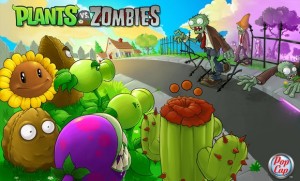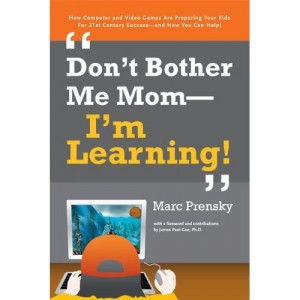
by Annie | Jul 22, 2010 | Game Design
Like vampires, zombies have mystified the masses for ages. But who knew that you could fight off zombies with pea-shooters, mushrooms, and other veggies? Plants vs. Zombies, released in 2009 by PopCap Games, has been a huge hit for casual and hardcore gamers alike. Even my mom loves it, laughing in delight as the zombies’ heads pop off. But why? What contributes to the game’s broad appeal? Here are a few conjectures: 1. Approachable theme Enhanced by well-polished graphics, the theme of the game is approachable by audiences of various ages and backgrounds. Using veggies as weapons provides a new twist for hardcore gamers and a familiar topic for younger audiences. 2. Simple mechanics A tower defense-style game of sorts, Plants vs. Zombies doesn’t require players to manipulate a variety of buttons to engage in actual combat with the zombies. Instead, players choose strategic placements for their plants with the click of a button, watching the battlefield from above and reinforcing their defenses when necessary. 3. Universal concept Everyone is familiar with the exchange of money and goods. Even toddlers understand that people must acquire money, then choose how and when to spend it. Preying on this universal concept, Plants vs. Zombies provides a new medium with which to earn and spend currency. Players must earn sun power to plant more veggies in order to defend their house from zombies. And who wouldn’t want to do that? So if you haven’t already, you should definitely consider taking on the role of veggie commander, defending your house and brains against the approaching wrath and hunger of the zombie...

by Annie | Jul 20, 2010 | Game Design
Imagine you’re a parent (this is less of a stretch for those of you who already have children). Your child is growing up in a world in which people use cell phones to check email and rely on GPS narration to guide them through unfamiliar territory. And of course, the ubiquity of computer and video games is unavoidable. So, do you let your kids play them? Let’s face it. The game industry is growing. Computer and video games are published every day. Story lines are becoming more complicated, and gameplay mechanics are changing. Often, toddlers as young as 2 years old play computer games or iPhone games on a regular basis. Isn’t this harmful? According to Marc Prensky, the contrary is true. Kids can actually learn more positive and useful things from computer and video games than from school, depending on how teachers and parents moderate kids’ gameplay experiences. Think about how much attention and energy kids devote to computer and video games. Now compare that to the attention and energy they put forth in the classroom. I can assure you that there are as many kids catching Z’s in the classroom as there were back in the “old days” before classrooms had interactive white boards and computers. But why? What’s the draw of video games? For one, kids, just like adults, love challenges. Give a kid an overly easy assignment, and you’ll catch them throwing paper airplanes soon after, counting down the minutes until recess. Give a kid a challenging assignment with the proper tools and scaffolding to help them complete it, and you get a focused and...
by Annie | Jul 19, 2010 | Game Design
Everyone knows that designing a game is pretty simple. All you need are gameplay mechanics, basic rules, and an objective. Designing a fun game, on the other hand, is a completely different beast. A couple of weeks ago, I was tasked with creating a list of 25-50 analog game ideas in order to create an original board game from scratch within the next 6 weeks or so. The first five ideas came pretty easily, but the rest felt like pulling teeth. Sitting outside on the balcony, I tried using everything in the environment for inspiration. Car zooms by – ah, racing game. Wind blows – hmm, leaf collecting game? Twenty-eight ideas later, I had a few decent ones. Now came the hard part: choosing an idea and developing it into a full-fledged game. I spent the better part of this past weekend drawing and staring at shapes, trying to imagine strategic moves and epic analog battles. My basic idea was for a spider web game involving prey capture and natural obstacles, like wind damage. Players would build the web, trying to capture prey while thwarting their opponents. Sounds pretty simple and fun, right? Not so fast. This is where play-testing comes in. Prototype after prototype revealed new and unforeseen challenges. Here are some issues I ran across: – Pieces bunch up when trying to capture the same prey. – Pieces spread out when trying to capture different prey. – Should prey placement be random? – How should players “build” a web? – How do you show the effects of wind on a board game? After a few iterations, I stepped back from...
by Annie | Jul 16, 2010 | Game Design
Not sure if games are worthwhile? Well, according to Jane McGonigal, games have the power to transform the world, giving players the skills to solve large-scale real world problems. Don’t believe it? Take a look. She can be quite...
by Annie | Jul 16, 2010 | Game Design
Maybe it’s the blog, or my love of reading, or my three-year break from student life, but I’ve discovered a new love for writing. Instead of dreading essay assignments, I now crave them. Just today, I completed two analysis papers within the breaks between classes, and I’m already hungry for more. Now, I can’t tell you whether or not my writing is actually any good; you’ll have to be the judge of that. I think the joy I get in writing is that I have a voice, a way to communicate my unique perspectives without any interruptions from others. I can shoot out all my thoughts, put them aside, then go back later and make them sound more coherent or add more humor. Writing gives me the freedom to share my writing when I please or keep it to myself without fear of judgment. As with many industries, game design is built around clear communication. Great game designers not only come up with great ideas, but they have the intellectual prowess to communicate those ideas effectively, both verbally and on paper. You might have the most innovative idea the world’s never heard of, but if you can’t tell people about it, it may soon become someone else’s great idea. So if you’re thinking about a career in the game industry, start first with a pen and paper. Jot down ideas for characters, for different levels…heck, you could even jot down what you had for lunch. Just write. The more you write, the better you’ll get. Think of it as leveling up, in the world of...




